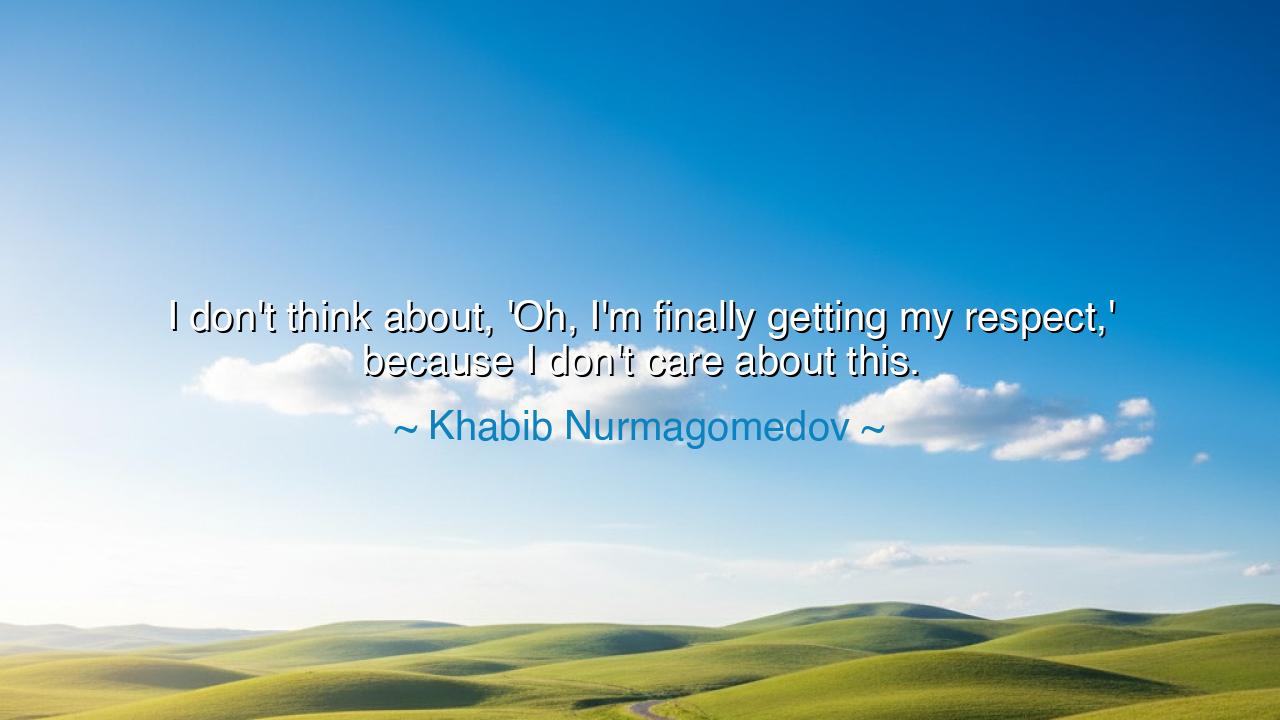
I don't think about, 'Oh, I'm finally getting my respect,'
I don't think about, 'Oh, I'm finally getting my respect,' because I don't care about this.






“I don't think about, 'Oh, I'm finally getting my respect,' because I don't care about this.” Thus declared Khabib Nurmagomedov, warrior of the octagon, son of Dagestan, whose life was marked by discipline, faith, and unshakable resolve. In these words lies a truth that rises above the vanity of men: that true greatness does not chase after the fleeting applause of the crowd. Respect may come, or it may not—but the one who is rooted in purpose, who fights for something greater than recognition, stands beyond the grasp of praise or scorn.
The ancients, too, knew this truth. Marcus Aurelius, emperor and philosopher, wrote in his meditations that the approval of others is nothing, a shadow that disappears with the setting sun. What matters is whether one has lived in harmony with duty and virtue. Khabib echoes this same wisdom: the roar of the crowd is not his compass, nor is the crown of respect his aim. His path is guided by honor, discipline, and faith in God—not by the fickle judgments of men.
Consider the story of the Spartan warriors at Thermopylae. They did not fight to be praised by history, though praise they received in abundance. They fought because it was their duty to defend their land, their people, their way of life. Their sacrifice was not born from a hunger for respect, but from a deeper devotion. And because they did not care for recognition, their legacy shines brighter than the monuments of kings who craved applause.
Khabib himself lived this principle. In victory, he remained humble, often refusing to boast of his triumphs. He was undefeated, yet spoke as though victory was not his own but granted to him by discipline, training, and divine will. When asked about the world’s recognition, he dismissed it, for he sought not to be exalted by men, but to remain true to himself, his family, and his faith. In this, he revealed the heart of a true champion: one who does not chase respect, but earns it through integrity.
O children of the future, take heed: if you live for the praise of others, you will be their slave. If you build your life on their respect, your foundation will crumble when their attention turns elsewhere. But if you root your life in virtue, discipline, and higher purpose, then you will remain unshaken, whether the crowd cheers or whether it jeers. This is the secret of freedom: to do what is right, not for recognition, but because it is right.
The lesson is clear: greatness lies not in demanding respect, but in not needing it. Live in such a way that respect comes to you naturally, yet care so little for it that its absence cannot harm you. For true honor comes not from the tongues of men, but from the quiet strength of a conscience at peace.
Therefore, let your practice be this: commit yourself to discipline in your craft, humility in your victories, and steadfastness in your values. Do not ask whether others see or respect you. Instead, ask whether you are faithful to your calling. Respect may follow, but it will no longer be your master.
So I say unto you: remember Khabib’s wisdom. Do not care for respect, for it is but a shadow. Care for your duty, your discipline, your truth. In doing so, you will find that you have gained something greater than respect: you will have gained freedom, strength, and a legacy that time itself cannot erase.






AAdministratorAdministrator
Welcome, honored guests. Please leave a comment, we will respond soon